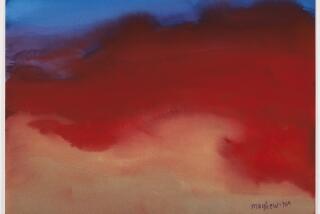Yusef Lateef--From Bars to the Rhythms of Nigeria
- Share via
Yusef Lateef is a man who is thoroughly in touch with the pragmatic and the aesthetic aspects of his art. A multi-instrumentalist (tenor saxophone/flute/oboe) and composer whose career began in the boites and bistros of jazz, he now has moved easily (and happily) to performances, seminars and teaching at institutions of higher learning.
“I stopped playing nightclubs in 1980,” he said this week from his rural Massachusetts home, “and I pray I don’t have to do that again. Believe me, it wasn’t a hard decision to make. I’d been playing in bars since 1939, so I think I’ve had enough of it. But it’s not easy. You have to find something else to support you. Fortunately, I have teaching.”
This weekend, the 67-year-old Lateef, who earned his Ph.D. at the University of Massachusetts in the mid-’70s, will illustrate the benefits of his embrace of academia in a weekend of activities at CalArts. Today, the faculty woodwind quintet will perform a newly composed Lateef work, and a concert Sunday afternoon will premiere a Double Concerto (created in tandem with percussionist Adam Rudolph) featuring Lateef on tenor saxophone.
Always an advocate of improvisation as an art that reaches far beyond the narrower definitions of jazz, Lateef has long been fascinated with other musics of the world. Recently, he spent four years in Nigeria studying the country’s abundant musical tradition and spoke with enthusiasm about the effect of the experience.
“There are over 300 ethnic groups in the area,” he said, “so there’s a wealth of musical traditions. I was there as a Research Fellow at the Center for Nigerian Cultural Studies. I had the privilege of researching and developing the sharewa, a bamboo flute that is very important in the indigenous music.
“Each person in the program had a different area--costumes, music, etc. Fortunately for me, much of the work that had already been done in those areas before I got there was well-documented. So I spent the first few months just reading this rich catalogue of information to orientate myself.
“It brought me,” he said, “to the point where I said to myself, ‘OK, Yusef, you’ve observed and seen a lot of things during these years. You’ve heard and listened to a lot of different concepts of music, rhythm, etc. So what is it that you can contribute now, as a result of your experience?’ And now I’ve set about to try and answer that question for myself. What is it that I can contribute?”
An unlikely response to the question came two years ago, when a Lateef recording, “Yusef Lateef’s Little Symphony,” received a Grammy as Best New Age Recording. Given that his music had no prior association with New Age, it was a startling achievement. But Lateef is typically stoic about the award. His antipathy for the word jazz does not pertain to New Age.
“The term doesn’t offend me,” he said. “I don’t think it has any negative connotations at all.”
In fact, the title may be more appropriate than it initially seems. Lateef’s music, with its connections to other cultures and other disciplines, has come to have the kind of open world view often associated with New Age at its best.
Lateef believes that the key element in his current work--as a teacher, composer and performer--is the connection between improvisation and composition.
“To me, it feels as though there’s a kind of aesthetic thread running through the improvisational musics of the world. If you’re alive and your heart is beating, you’ll find it, and that’s what makes the relationship between you and the world.”
More to Read
The biggest entertainment stories
Get our big stories about Hollywood, film, television, music, arts, culture and more right in your inbox as soon as they publish.
You may occasionally receive promotional content from the Los Angeles Times.










